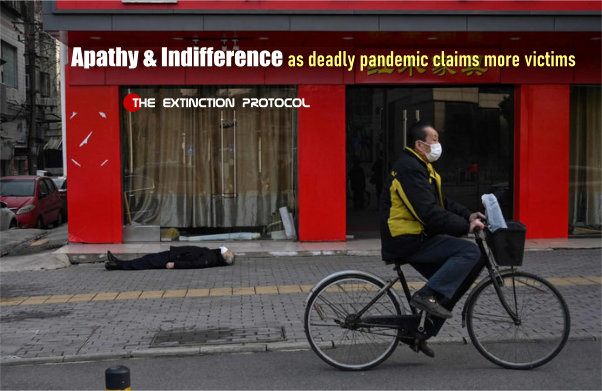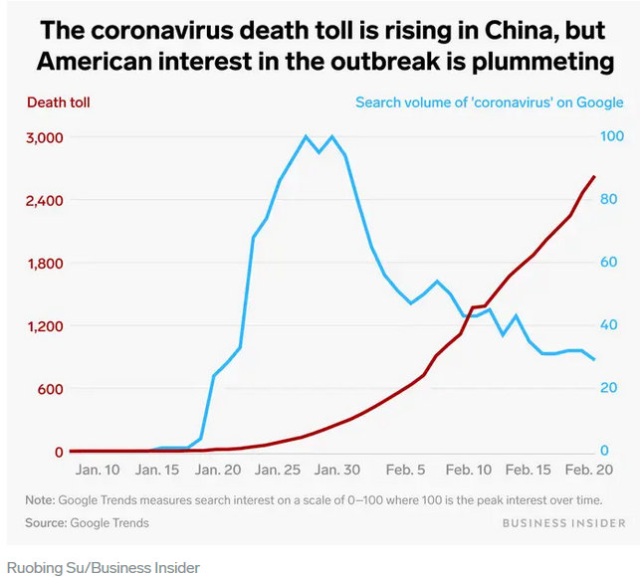As the global death toll rises; many are still not taking the coronavirus seriously enough to stop it from spreading

The number of coronavirus cases in the United States keeps jumping each day by the hundreds, pushing health care officials and political leaders to take steps to keep the pandemic from overwhelming the system. The battle is to get equipment and beds to doctors and nurses and to stem the economic fallout by taking measures to provide financial relief. The bad news is, as more tests become available, more people will find out they have Covid-19, the disease caused by the new virus. That means many more patients at already stressed hospitals. Governors and mayors are trying to do their part by seeking more items such as masks and ventilators and calling for their citizens to avoid others until the number of cases doesn’t look like a steep hill, both on paper and in reality.

All shock and no awe: A February 24, 2020 graph from Business Insider showed U.S. public interest in the pandemic was already in serious decline. By the time the virus began exploding on American shores, panic had already set in. Still, to this day, many young people are seemingly indifferent to the deadly pandemic that has inconveniently disrupted their lifestyle.
Maryland Gov. Larry Hogan told CNN’s Wolf Blitzer he is concerned about medical shortages. “We’re trying to get 6,000 hospital beds online. We’re trying to deal with all of these issues,” he said. “The flattening out of this curve that you keep hearing everybody talking about is so critical, because if we don’t do that with the social distancing … then the system is completely overwhelmed and the health care system is incapable of dealing with such a crush of people all needing acute care at the same time.” As the US death toll grew to almost 150, states are ordering more shutdowns. Hospital employees are making their own face masks or sometimes using them twice. And doctors are begging the public to keep their distance from others.
As the U.S. death toll grew to almost 150, states are ordering more shutdowns. Hospital employees are making their own face masks or sometimes using them twice. And doctors are begging the public to keep their distance from others. “We’re talking about potentially 12 or 18 months of this,” Dr. Michael Osterholm, director of the Center for Infectious Disease Research and Policy at the University of Minnesota, told CNN’s Jake Tapper. “And so, while we have to plan each day’s battle, as has been said, this is a war. We’ve got a number of days of battle to do. So, we have to figure out now how we’re going to get these hospitals through, not just today, not this week, not next week, but potentially months of being under siege with these cases.”
He said many patients spend three weeks or more in the hospital, so bed space will become an issue for some health care facilities as early as this weekend. Two major factors are fueling this pandemic: the fact that people with no symptoms can easily spread the virus, and problems with testing in the United States. That’s why it’s critical for everyone — even those who don’t feel sick — to stay at least 6 feet away from others and avoid social gatherings. –CNN
Now devastating the Young and Healthy: A Belgian doctor working to battle the coronavirus says he’s treated several seriously ill young patients — and their lung scans were “nothing short of terrifying,” according to reports. Dr. Ignace Demeyer, who works at a hospital in Aalst, said an increasing number of people between the ages of 30 and 50 have presented with severe symptoms, despite having “blank medical records” that show no underlying conditions that would make them high-risk, the Brussels Times reported.
“They just walk in, but they are terribly affected by the virus,” Demeyer told the Belgian broadcaster VRT. He said CT scans indicated they were suffering from severe lung damage. “The images we took yesterday are nothing short of terrifying,” the doctor told the station. “They are people who do not smoke, who have no other conditions such as diabetes or heart failure,” Demeyer added. –NY Post

Comments
Post a Comment